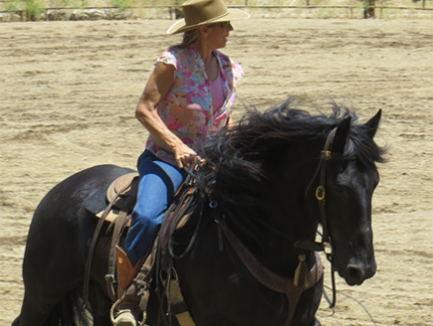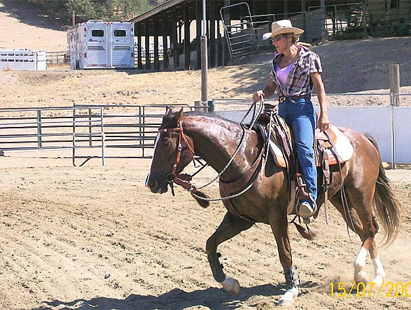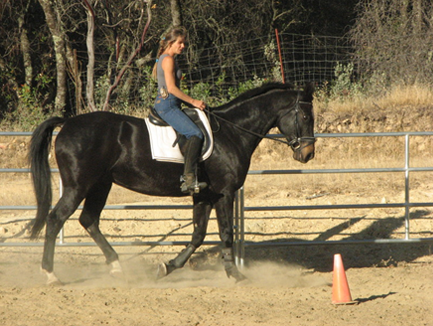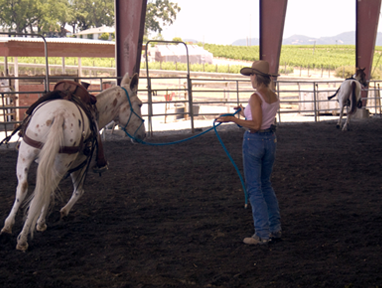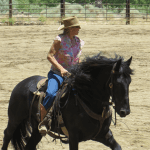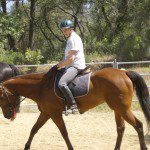“You can not safely ride a horse that does not feel safe” Safety and confidence is achieved through understanding and knowledge. Susan’s passion and commitment is teaching horses and owners to communicate with each other– to build a partnership. She emphasizes a strong foundation of good behaviors to produce soft willing partners in equines without force or devices, as well as teaching humans how to gain confidence through having control of the horses feet and mind. Susan competes in challenges in various disciplines from colt starting to extreme cowgirl, reining, and cowboy dressage. She has placed first, second or third in each event in which she participates.
Susan is located in Shingle Springs, Ca (Sacramento area) and offers professional horse and mule behavior evaluations-problem solving, private and group riding lessons, ground work clinics, and horsemanship clinics, as well as horse and mule training for all disciplines. She specializes in starting young equine stock and problem solving for aged animals. Her horsemenship program builds confidence through control and safety for both the horse and mule and their owners. Susan’s passion for horses started at a very young age. Born in the Midwest she began her English riding career at 7 years of age. At 9 years old she was riding Thoroughbred hunters and jumpers in the local Chicago area shows. She owned her first horse in California when she was 11, and has shown English, jumping, bareback and gymkhana. Over the years her passion gave birth to the dream of one day training horses and teaching humans to communicate better and subsequently be safer with their horses/mules.
Through desire, determination, practice and more practice she has obtained that dream- and has continued to study the horse/mule, and gain skills to teach horse owners of every level.
In 2010 Susan participated in the Rescue Me Challenge sponsored by Grace Foundation. The Challenge was viewed live at the California State Horse Expo, and Susan received a Third Place Award in her division. It was a wonderful success all around as her project horse Zeus was adopted and lives happily in his new home, which was the ultimate goal of the event.
Susan was also a featured trainer/clinician at the Napa Mustang Days event in Napa Ca, September 16th – 18th. 2011, and has been involved in presentations throughout 2012 for horsemanship for all disciplines and horse types.
She was asked to return again and was a featured trainer at the Napa Mustang Days June 14th-16th 2013.
In 2014 Susan was featured trainer for the FALL EQUESTRIAN SYMPOSIUM at Brookside Equestrian Center and offered many hands on mini clinics and demos to the attendees of this 3 day event.
Susan is also a member of Alliance for Horses a group of Trainers with a focus on supporting rescue horses and their adopters for success in the transition. The consortium is dedicated to bringing people of integrity together to reveal the value of the unwanted horse, through visionary education of horses and humans. She has participated in the 2013 and the 2014 Horsemanship Fair sponsored by this Alliance- all proceeds being donated to the participating Rescues.
Susan continues her education and in 2016 Completed The Western Dressage Association (WDAA) “Train The Trainers” Clinic in Rancho Murietta, and is dedicated to promoting this discipline as it relates to her goals and her students goals with their horses. Western Dressage honors the horse and the relationship and communication with the horse so that both horse and rider can progress and be the best that they can be.
A couple of Susan’s favorite Quotes- by Bill and Tom Dorrance
“What a person has in their mind to present to the horse needs to be something that’s possible for a horse to actually do. Then the person has to be able to understand it themselves, through feel, and apply it in a way that the horse can understand. This is difficult because no two horses are the same, and there’s plenty of adjusting a person needs to figure on for this. Even if the picture they have is okay, when they handle a horse with more firmness than he needs, they’ll get a wrong response nearly every time and think the horse is at fault. When that’s their thinking, they’re liable to just apply a lot more pressure on the horse – which really mixes him up. And from the horse’s response, the person can get the idea that he doesn’t want to do what they’d like him to do. This is correct in a way, but it’s really just because the horse can’t figure out what they want him to do, because he doesn’t understand that pressure-feel they put on him in the first place. What makes this so bad is that those horses – I’ll say most horses – would cooperate if they could only understand.” – Bill Dorrance
“There is a complete control over the horse when the person’s thought becomes the horse’s idea. And there’s no place at all about dominating the horse in the connection we are building here. That would be way out of line.” Bill Dorrance
TOM DORRANCE about MULES
“Every now and then somebody asks me what the difference is between horses and mules.
What I think it is.
And the best answer I’ve been able to come up with is the mule and the horse is the same, but the mule is more so.
Ever since I can remember I’ve heard people talk about the mule being stubborn.
I tell people “I never saw a stubborn mule.”
I’ve seen the mule shut down for a while, to try to give the person time to figure out what the person should be doing
And I’ve watched that a lot, during my lifetime.
And that’s just about as true a picture as I can try to describe.
And when you think about it, a lot of people don’t even want to listen to it, but if they think about it, maybe next week, or later, they might chuckle about it.
And begin to see what I meant.” Tom Dorrance

